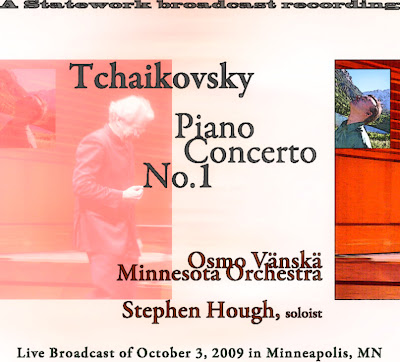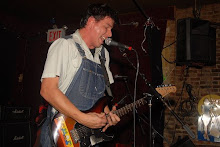
As Ictus 75 points out, "You can watch the whole performance here:" http://www.digitalconcerthall.com/en/concert/248
Music and Arts

As Ictus 75 points out, "You can watch the whole performance here:" http://www.digitalconcerthall.com/en/concert/248


EDIT: My enthusiasm got the better of me here again. I listened a few times, got crazy and did not check the availability. Though my admiration for the BBC Legends series is boundless, lately I've not kept up on the releases.
This is available from BBC Legends, although the recording downloadable here is an alternate broadcast source (as evidenced by the partial announcements) and is in any case too good to miss. Please, anyone interested, use this one as an appetizer before getting the official release!
Frédéric Chopin
Nocturnes (selection)
Maria João Pires, piano
Pic Thanks to minhavidadava1filme.blogspot.com
July 21, 2010
Royal Albert Hall
London UK
BBC broadcast of Proms 2010: Prom 7
Op. 9, Nos. 1-3
Op. 15, Nos. 1-3
Op. 27, Nos. 1 and 2
Op. 62, Nos. 1 and 2
Op. 71 (Posthumous) Lento con gran espresione
Op.72 No.1.mp3
Op. 37 No.1
I hold this music closest to my heart, having listened to them from birth- in Ivan Moravec's recordings from the 60's. One day I will procure a Chopin recital by him and place it here.
Now Maria João Pires is to me the pianist whose recording of the Nocturnes holds equal stature with Moravec's, while mining such different emotional terrain with them; when I saw she had played the Proms this year I flipped out.
So here is the sound. Sit up straight for this music, listen close. Please
Some of The Telegraph's review:
"... unexpected intimacy accounts for some of the intensity of Maria Joao Pires’s recital of Chopin Nocturnes on Wednesday. But it would have counted for nothing without her special poetry. She’s a tiny, almost bird-like figure, and she seemed even smaller in that huge space, which was packed with more people than I’ve ever seen for a late-night Prom. It must be daunting for a pianist, but Pires seemed perfectly at ease, as if she was playing for a few friends at home.
That gives her performances an air of total sincerity. Usually in Chopin performance you can tell that expressivity is being mingled with sheer sensuous pleasure in playing the piano, and a relish for the delicious sparkly sounds that result. There’s nothing wrong with that – Chopin performance doesn’t have to be purist. But there is something compelling about a pianist who just doesn’t care about those things. Pires wants to get at the poetic heart of the music, and here she did that time after time.
The word Nocturne implies something dreamy and indistinct, but Pires’ performances reminded us that the expressive range of Chopin’s pieces is much bigger than that. There was the total rapt stillness of the early Bb minor Nocturne, uncannily clear, like a moonlit landscape. There was the fascinating uncertainty of the G major Nocturne Op. 15, which she poised so perfectly on the cusp between hesitancy and impetuous ardour. The late Nocturne in E major suddenly becomes stormy at its mid-point, but Pires managed to project this while suggesting it was only a momentary flurry – maybe only a dream – while the night-time stillness was still continuing, somewhere beyond our hearing. That is artistry of a very special order."
And The Guardian:
"...
The evening turned out to be a special one for piano fans. The Portuguese pianist Maria João Pires made a rare appearance with a generous selection of Chopin's nocturnes as the late-night event...
Pires's playing was unostentatious but commanding, controlled yet free-flying in its sensitivity to the fluidity of Chopin's lines, and in its responsiveness to the scope of pieces still sometimes marked down as delicate miniatures."
Play it loud and clear, spread it around.
Thank you so much to http://minhavidadava1filme.blogspot.com for the great live picture of Maria João.
Guillermo


Gustav Mahler
Symphony # 9
The Philadelphia Orchestra
Carlo Maria Giulini, conductor
Alan places the recording from either the March 17
(Friday concert) or March 18 (Saturday evening concert)
Philadelphia, PA
1972.
Ray contributed this, "One of the great performances of this symphony. In excellent sound. "
In the crowded football field full of Mahler 9th recordings that exist in the world, here is a standout, a steal, a touchdown.
-Or, as some of my fellow broadcast freaks ahem, expert listeners have effused: "...a gem, indeed...", "As fine as his studio recording is, this is even better. Again, the situation of a live performance is just more tense and intense. Did I hear
Giulini's voice somewhere in the first movement? And forget about that
trumpet intonation at the start of III, the orchestra is flat out gorgeous..."
Tom V, a Statework member, remembers the concerts:
"I was there at the Saturday night concert, up in the $1.50 or $2 "nosebleed" seats in the amphitheatre of the Academy of Music. It was my first live performance of any Mahler symphony and "live" is an understatement.
Giulini's Chicago recording never matched my memories of the Phila concert. Now I know my memory is correct.
Three notes:
1.Giulini conducted the performance w/o a score.
2. I don't recall a dog barking during Saturday's performance, so this must be Friday.
3. The announcer is probably from the late lamented WFLN, which was heavily involved in the production of the Orchestra's radio series for many years..."
My own scribbling from a third hearing (many more have passed since then!) include '...incisive attacks-surging, oceanic but opposite of schmaltz-then a clearing, a respite...3:47 Giulinian stomping ensues-'
Please listen closely to this recording for what you will, not least of which may include the oddball, "...And I thought there was a dog bark in the last movement! Sounded like a little lap thing who woke up in her master's purse"
En fin, a must-have. If it happens to be your first brush with the Mahler 9th or Mahler 's work (gasp!) in general, you couldn't have come across a finer first date. And before this I thought I was taking a Mahler vacation...

Minnesota Orchestra
Osmo Vänskä, conductor
Stephen Hough, soloist
October 3, 2009
Program:
[Wagner Siegfried Idyll- available but not in this post]
Tchaikovsky Piano Concerto No. 1
including Siloti's de-arrangement of the slow movement as an encore
[Bartok The Miraculous Mandarin- unrecorded]
Hyperion Records (UK) http://www.hyperion-records.co.uk/dc.asp?dc=D_CDA67711/2&vw=dc
will offer this recording (mixed in, I imagine, with a few other nights' efforts) officially as a CD in March, but this is a sneak peek in decidedly inferior sound. Huge fun.
Yes, I still love the warhorses. So what. I can enjoy the weirdo, off beaten pathway modern composers deeply, but you've got to get silly and wave your arms around to a tried-and-true stonker every so often as well. Here is the Tchaikovsky First, and if it is your first version of it, you are in for it.
There's a small leap in the sound continuity right in the beginning, but none of it can detract from the happening captured here.
I admit to being an impatient listener to yet another new Tchaikovsky First, usually going straight to the Third Movement's hustle and sprint to see what the pairing of orchestra and soloist is up to by then. No disappointments at all there, and the whole affair holds more delights, even upon repeated listening- what more to ask?
The take is a rip-snort, plunge-taking, ace-at-the-controls barnstorm that brings to mind the epic 1940 Carnegie Hall battle between the young Horowitz and Barbirolli, abetted by a whipsmart New York Philharmonic in that instance.
Though more controlled and cooperative here, the give and take of the Minnesotans and Hough is something I can't wait to hear in high quality sound on official release!
enjoy, best heard at unconscionable volume and with a generous nature towards lo-fi...

Gustav Mahler
Symphony No.3
Royal Concertgebouw Orchestra
Mariss Jansons, conductor
Bart Claessen (trombone), Liviu Prunaru (violin), Frits Damrow (Trumpet)
Bernarda Fink, mezzosoprano
Boyschoir Rijnmond, Sacramentskoor Breda
Groot Omroepkoor
February 5th, 2010
Concertgebouw, Amsterdam
169.91 MB in a .zip folder containing four mp3 files, 'art' and text with information inside. See comments.
This thanks to an upload by Epicóndilo, of the foroactivo Mahler tribe
I think I can make up for the excising of Martinon's Mahler 3 links now.
This Mahler Symphony no. 3 is worth strapping good sound on for (even though the 192 kbps original bitrate does little to support that thought), in part for the detail that Jansons has been able to bring to surface and for the tempos he sustains. How the thing is kept moving so inexorably forward, with that special sense of occasion that marks great performances, is a feat that can only be properly explained in the doing. It is done here. Press play & listen, read no more. But if you must-
Jens Laurson of musicweb has a review of the live event which shows unhappiness with this crew, panning the performance from the night before, Feb 4. The present mp3s record a different night, and a different story. The last of a triumvirate of M3 offerings, I think the Concertgebouw was back in fighting shape for this one, if the musicweb reviewer was right about an off-night just 24 hours earlier.
There's a sequence, a set piece in the final movement which is particularly telling, that came though the headphones at 3AM the first time I listened carefully to this recording. It had not been apparent to me before! [This may be just a confession of heathenness] The movement, which is originally named "What Love Tells Me", has within it a solo violin phrase which blooms supported by the orchestra, is repeated by its cohorts, then again by a larger swath of orchestral textures against the evolving backdrop. The phrase comes back beautifully in various guises thereafter, but I had not been as struck by the concerto-like moment of the soloist until now. This is true even though the violin is sonically set back quite a bit here, and ends up having more room (reverb) around it; it ended up highlighting the experience to me.
Enjoy!
Guillermo
If you are the composer, performer, performing organization, artist or directly represent the composer, performer, performing organization, or artist of anything posted on this website and would like your material removed please contact me and I will happily oblige.
